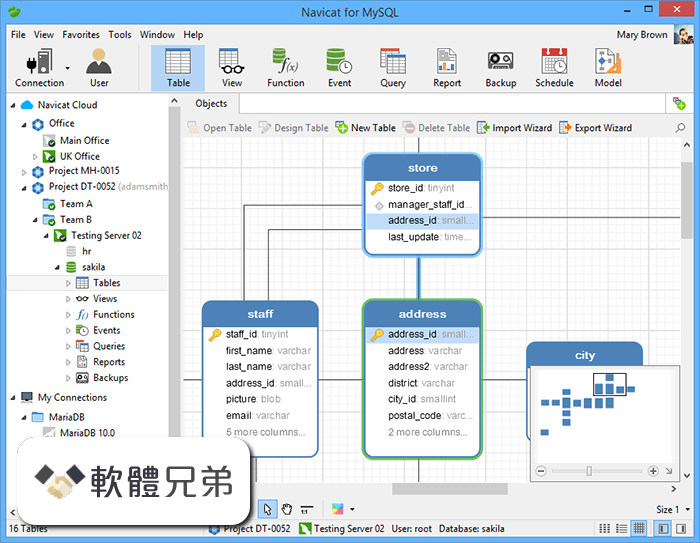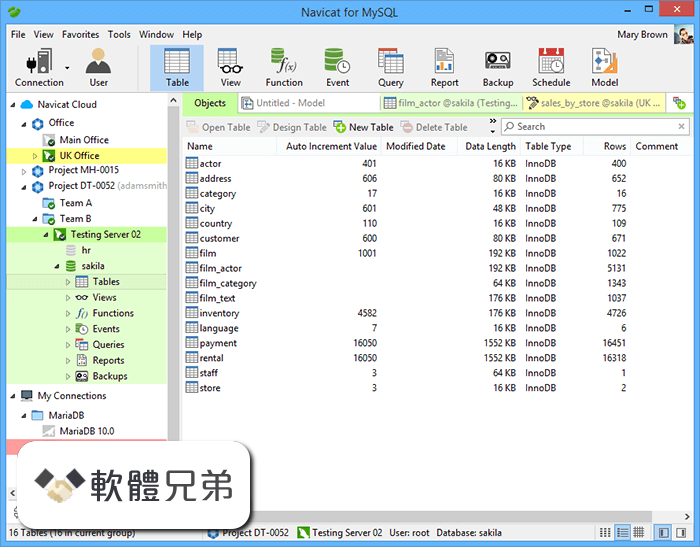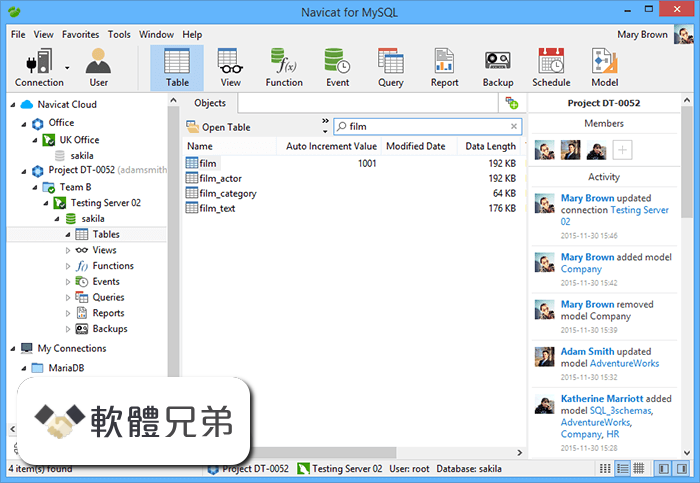Gradle 6.1
Navicat for MySQL 64 位連接到本地 / 遠程 MySQL 或 MariaDB 服務器。它適用於 3.21 或更高版本以及 MariaDB 5.1 或更高版本的 MySQL 數據庫服務器。它也與 Drizzle,OurDelta 和 Percona Server 兼容,並且支持大多數最新的功能,包括表,視圖,函數 / 程序,事件等等。下載 Navicat for MySQL Offline Installer 安裝程序 64bit for PC!
主要功能包括 SQL Builder / 編輯器,數據建模工具,數據傳輸,導入 / 導出,數據 / 結構同步,報告等等
注意事項:14 天試用版限制是嘮叨屏幕.
也可用:下載 Navicat MySQL for Mac
ScreenShot



| 軟體資訊 | |
|---|---|
| 檔案版本 | Gradle 6.1 |
| 檔案名稱 | gradle-6.1-all.zip |
| 檔案大小 | 132 MB |
| 系統 | Windows XP64 / Vista64 / Windows 7 64 / Windows 8 64 / Windows 10 64 |
| 軟體類型 | 未分類 |
| 作者 | PremiumSoft CyberTech Ltd. |
| 官網 | https://www.navicat.com/products/navicat-for-mysql |
| 更新日期 | 2020-01-16 |
| 更新日誌 | |
|
What's new in this version: Improvements for plugin authors: Gradle 6.1 相關參考資料
Gradle 6.0-rc-1 Release Notes - Gradle User Manual
Java 6 and 7 can still be used for compilation and forked test execution. Just like Gradle 5.x, any supported version of Java can be used for compile or test. https://docs.gradle.org Gradle 6.1 Release Notes - Gradle User Manual
The Gradle team is excited to announce Gradle 6.1. This release supports a relocatable dependency cache, makes compilation order between Java, Groovy and ... https://docs.gradle.org Gradle 6.1-milestone-1 Release Notes - Gradle User Manual
The Gradle team is excited to announce Gradle 6.1-milestone-1. This release features 1, 2, ... n, and more. We would like to thank the following community ... https://docs.gradle.org Gradle 6.1-milestone-3 Release Notes - Gradle User Manual
The Gradle team is excited to announce Gradle 6.1-milestone-3. This release features 1, 2, ... n, and more. We would like to thank the following community ... https://docs.gradle.org Gradle 6.1-rc-1 Release Notes - Gradle User Manual
The Gradle team is excited to announce Gradle 6.1-rc-1. This release supports a relocatable dependency cache, makes compilation order between Java, ... https://docs.gradle.org Gradle 6.1-rc-2 Release Notes - Gradle User Manual
The Gradle team is excited to announce Gradle 6.1-rc-2. This release supports a relocatable dependency cache, makes compilation order between Java, ... https://docs.gradle.org Gradle 6.1-rc-3 Release Notes - Gradle User Manual
See the Gradle 6.x upgrade guide to learn about deprecations, breaking changes and other considerations when upgrading to Gradle 6.1-rc-3. For Java, Groovy ... https://docs.gradle.org Installation - Gradle
Installation. The current Gradle release is 6.1. You can download binaries and view docs for all Gradle versions from the releases page. Prerequisites; Additional ... https://gradle.org Version 6.1 - Gradle User Manual
Run gradle wrapper --gradle-version 6.1 to update the project to 6.1. ... For Gradle 6, usage of the build scan plugin must be replaced with the Gradle Enterprise ... https://docs.gradle.org What's new in Gradle 6.0 - Gradle
New features in Gradle 6.0 since version 5.0. Plugin development, dependency management, Groovy incremental compilation. https://gradle.org |
|
